 "Then Jesus said:… 'And you shall know the truth and the truth shall make you free.'" John 8:31-32 The first casualty in war is truth. Beware the Victor's Version As my history teacher in Rhodesia reminded us: Beware the victor's version! War time propaganda becomes school textbooks. Mass Suggestion As early as 1930, John Dewey observed that: We are being exposed to the greatest flood of mass suggestion that any people has yet experienced. Manipulation of Public Opinion Propaganda is to Democracies what violence is to Dictatorships. Propaganda, the calculated manipulation of public opinion to serve political and ideological interests, is pervasive. We are also exposed to commercial propaganda: Marketing and Advertising.
0 Comments
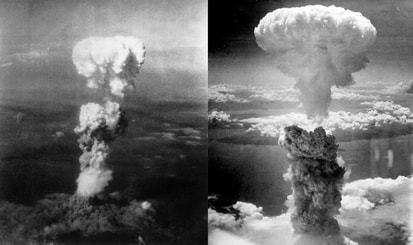 Did the Atomic Bombs Actually Save Lives? I was taught that the U.S. dropped nuclear bombs on Hiroshima and Nagasaki in order to end WWII and save both American and Japanese lives. But most of the top American military officials at the time said otherwise. The U.S. Strategic Bombing Survey group, assigned by President Truman to study the air attacks on Japan, produced a report in July of 1946 that concluded: "Based on a detailed investigation of all the facts and supported by the testimony of the surviving Japanese leaders involved, it is the Survey's opinion that certainly prior to 31 December 1945 and in all probability, prior to 1 November 1945, Japan would have surrendered, even if the atomic bombs had not been dropped, even if Russia had not entered the war, and even if no invasion had been planned or contemplated." 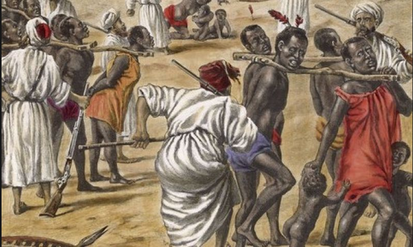 While much has been written concerning the Trans-Atlantic slave trade, surprisingly little attention has been given to the Islamic slave trade across the Sahara, the Red Sea and the Indian Ocean. While the European involvement in the Trans Atlantic slave trade to the Americas lasted for just over three centuries, the Arab involvement in the slave trade has lasted fourteen centuries, and in some parts of the Muslim world is still continuing to this day. CONTRASTS IN CAPTIVITY A comparison of the Islamic slave trade to the American slave trade reveals some interesting contrasts. While two out of every three slaves shipped across the Atlantic were men, the proportions were reversed in the Islamic slave trade. Two women for every man were enslaved by the Muslims. While the mortality rate for slaves being transported across the Atlantic was as high as 10%, the percentage of slaves dying in transit in the Trans Sahara and East African slave trade was between 80 and 90%! While almost all the slaves shipped across the Atlantic were for agricultural work, most of the slaves destined for the Muslim Middle East were for sexual exploitation as concubines, in harems, and for military service. While many children were born to slaves in the Americas, and millions of their descendants are citizens in Brazil and the USA to this day, very few descendants of the slaves that ended up in the Middle East survive. 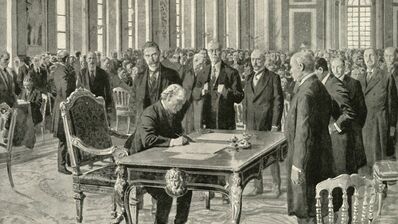 “Injustice, arrogance, displayed in the hour of triumph will never be forgotten or forgiven.” – Lloyd George, 1919 “Those three all-powerful, all-ignorant men… sitting there carving continents with only a child to lead them.” – Arthur Balfour German Victories on the Eastern and Southern Fronts After defeating the Italians at Caporetto and the defeat of Romania and Russia, in early 1918, a million German soldiers had been released to join their comrades on the Western Front for the last great German offensive of the war. Western Offensive By April 1918, Ludendorff’s armies were back on the Marne River and Field Marshal Sir Douglas Haig was issuing his order: “With our backs to the wall… each of us must fight on to the end… Every position must be held to the last man: there must be no retirement.” America Upsets the Balance of Power in Europe In the end, the Americans proved decisive. By spring 1918,300,000 American soldiers were in France; by summer, 1,000,000. With fresh American soldiers moving into the front lines at 250,000 a month, German morale sank. Peace Overtures On October 5, 1918, Prince Max of Baden sounded out President Wilson on a peace based on the Fourteen Points he had laid out in January. Three days later, Wilson asked Prince Max if Germany would accept the points. On October 12, Prince Max gave assurances that his object in “entering into discussions would be only to agree upon practical details for the application” of the Fourteen Points to a treaty of peace. 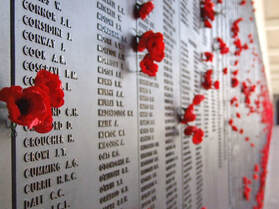 Remembrance Day Throughout the English speaking world, the 11th November is observed as a Remembrance Day to solemnly recall the end of hostilities of World War One at the 11th hour of the 11th day of the 11th month of 1918. In time, it has come to be observed as a Memorial Day for all who died in both World Wars and in other subsequent conflicts. 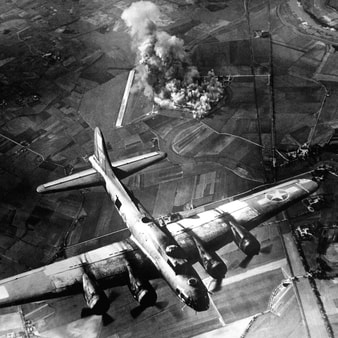 Bombarded On Mission outreaches in Sudan I experienced aerial, artillery and rocket bombardments. However these experiences were insignificant compared to that of my parents in the Second World War. My Father served as a bombardier in the Royal Artillery in the British Army for the whole 6 years of the war. He told me of the Heinkel III’s coming over his military base and turning his barracks into matchsticks as he lay flat on the parade ground with debris blown high into the air pummelling him into the ground! My mother was only 6 years old when she experienced her first bombing. It was September 1940, she was at the circus in Berlin when the British bombed them. She was almost trampled in the stampede to flee the exploding bombs. Many times my mother heard the air raid sirens and had to rush to the air raid shelters. Frequently she saw the green and red parachute flares dropped by the lead bombers to guide the thousand bombers where to unleash their cargo of death and destruction. Her neighbourhood was turned into blazing rubble. 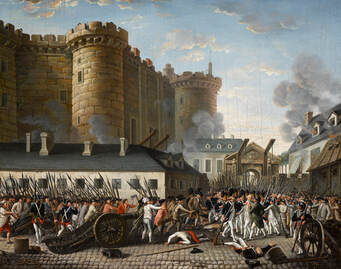
14 July is celebrated in France as Bastille Day. It commemorates the storming of the Bastille and the launch of The French Revolution.
This article can be viewed as a PowerPoint on Slideshare. To hear the audio lecture on The French Revolution, click here. To view the video Presentation click here A Time of Turmoil The French Revolution was one of the most influential events of modern history. The ten-year period from 1789 to 1799 when France went from a Monarchy to a Republic, to a Reign of Terror, to Dictatorship was one of the most tumultuous times in European history. Myth and Reality Much myth and romantic legend has been written on what some politicians would like the French Revolution to have been, but the reality was that the French Revolution was a monstrous horror. In the name of "liberty, equality, fraternity or death!" over 40,000 people lost their heads to the guillotine, 300,000 people were publically executed by firing squads, drownings and other methods of mass murder and ultimately many millions died in the 25 years of war and upheavals that resulted. 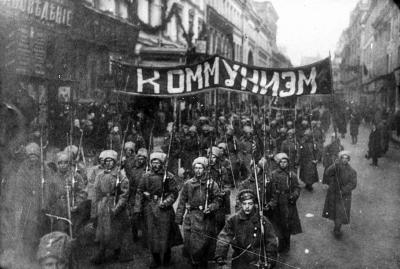
To hear the audio lecture of this article, click here.
To view the video presentation of this article, click here. To view the PowerPoint presentation of this article, click here. Bitter Winter of Discontent The Russian winter of 1916/1917 was one of the coldest in memory. On 23 February (by the old-style Russian calendar, or 8 March, by the Western calendar) 1917, 90,000 textile workers went on strike. By the next day, half of the industrial workers in St. Petersburg were on strike. By the third day, the number had risen to almost a quarter of a million. Defeats Lead to Disaster The continual string of defeats in the First World War, the chronic shortage of food and, perhaps most importantly, the lack of fuel for cooking and heating, led to what was called the Women’s Strike, although far more men were involved. Riots broke out, people were killed. Shops were looted. 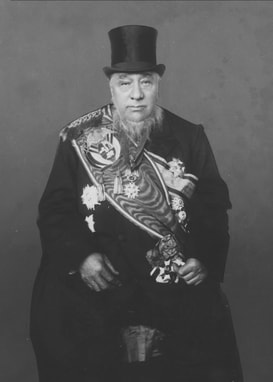
To view a video on this article, click here.
To view a PowerPoint on this article, click here. To listen to an audio of this article, click here. To listen to the radio on this article, click here. 10 October used to be celebrated as Kruger’s Day, a public holiday in South Africa, which marked the birth of this great founding father of our nation. Oom Paul was born on his grandfather's farm at Bulhoek, 10 October 1825. Paul's parents were Casper Kruger and Elsie Steyn. Drought, locusts and migrating herds of buck forced them to lead a nomadic existence in the Karoo. He was hardened by nature and schooled by the Bible. He received only three months of formal education, mostly being home schooled. He read the Bible daily. Voortrekker His father, Casper Kruger, joined the Trek party of Hendrik Potgieter in one of the very first of the expeditions, 1835. As a young boy of 10-years-old, Paul Kruger set out on the Great Trek under Hendrik Potgieter. 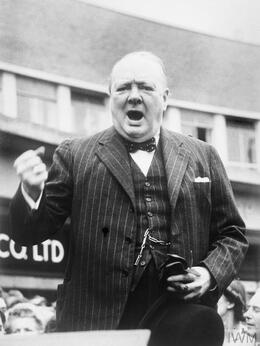 Darkest Hour highlights Winston Churchill’s extraordinary eloquence and showcases some of his most famous war time speeches. In his first address to the House of Commons as Prime Minister on 13 May, “I have nothing to offer but blood, toil, tears and sweat… you ask, what is our policy? I will say, it is to wage war! By sea, land and air! With all our might and with all the strength that God can give us; to wage war against the monstrous tyranny, never surpassed in the dark, lamentable catalogue of human crime… you ask, what is our aim? I can answer in one word: Victory, victory at all costs, victory in spite of all terror; victory however long and hard the road may be!” Marshalling the English Language for War As an observer noted, Winston Churchill marshalled the English language and sent it into war. Certainly his policy of war at all costs, meant an extremely long and hard ruinous road for the people of England, Europe and indeed the whole British Commonwealth. Was it Really Necessary? But the film Darkest Hour does raise the question: Was it necessary? Could Britain have chosen the road of peace and negotiation? That indeed is the whole premise of Patrick Buchanan’s book, Churchill, Hitler and the Unnecessary War – How Britain Lost its Empire and the West Lost the World. |
Categories
All
Archives
October 2022
|
 RSS Feed
RSS Feed